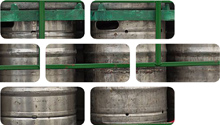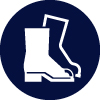
Beer Kegs Metal 15 01 04
Beer keg and cask containers are manufactured from aluminum and stainless steel may still be pressurised from previous use. They are used to package, transport and dispense beers from over 700 breweries and micro-breweries in UK. Beer kegs and casks may be coated in paint for identification purposes. They are often used with compressed gas cylinders to activate and dispense the beer inside. They are of standard sizes to suit ease of delivery and handling and may display the name of supplier and beer. All beer kegs and casks should be returned to the original supplier or recycled by an accredited waste management company - refer to Further Reading below. It is a crime to illegally handle or dispose of beer kegs and casks or their parts.
Usage & Probable Locations
Unwanted and unidentifiable beer kegs and casks are occasionally found on derelict sites where the previous use was a pub, club or entertainment venue. They may have been used for the previous function of the facility or for events and may be found in bars, store rooms or basements. They must be returned to the original supplier, their appointed representative or an accredited waste management facility.
Personal Protective Equipment
PPE requirements indicated are for guidance purposes only. DRIDS has identified the PPE that is mandatory on all demolition projects and ones that may be required subject to site specific Risk Assessment & Method Statement (RAMS). Hover over the icon to determine the types of PPE required for the removal of this material.
Removal, Segregation & Storage
Unwanted or unidentifiable beer kegs or casks should be stored carefully and safely and arrangements made for return to the original supplier. They should be stored upright on pallets and taped together if possible. They should be stored safely and out of sight to prevent theft and away from all plant movements and site activities. Beer kegs and casks destined for return, reuse or recycling should only be released to the legitimate owner, their appointed representative or an accredited waste management facility. Refer to the Accredited Scrap Yard List or contact Keg Watch or the British Beer & Pub Association for further details - refer to Further Reading.










